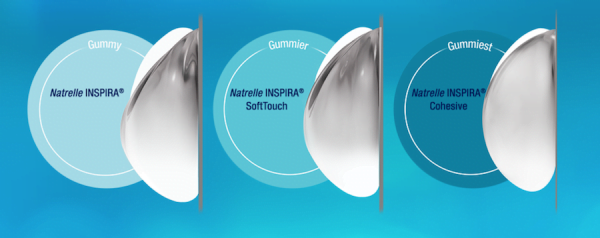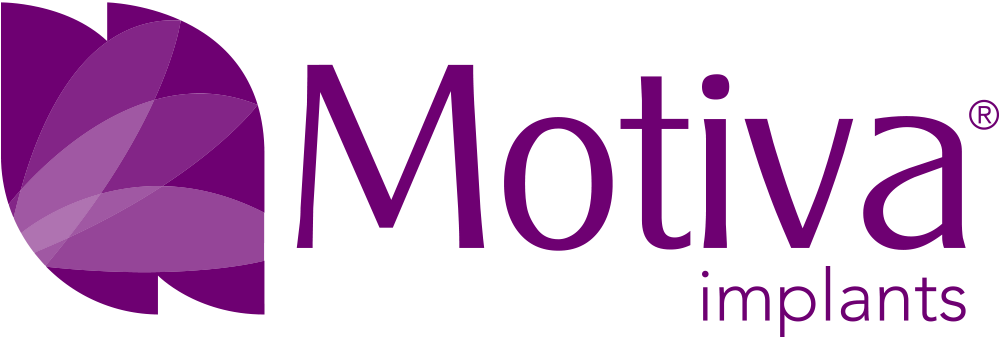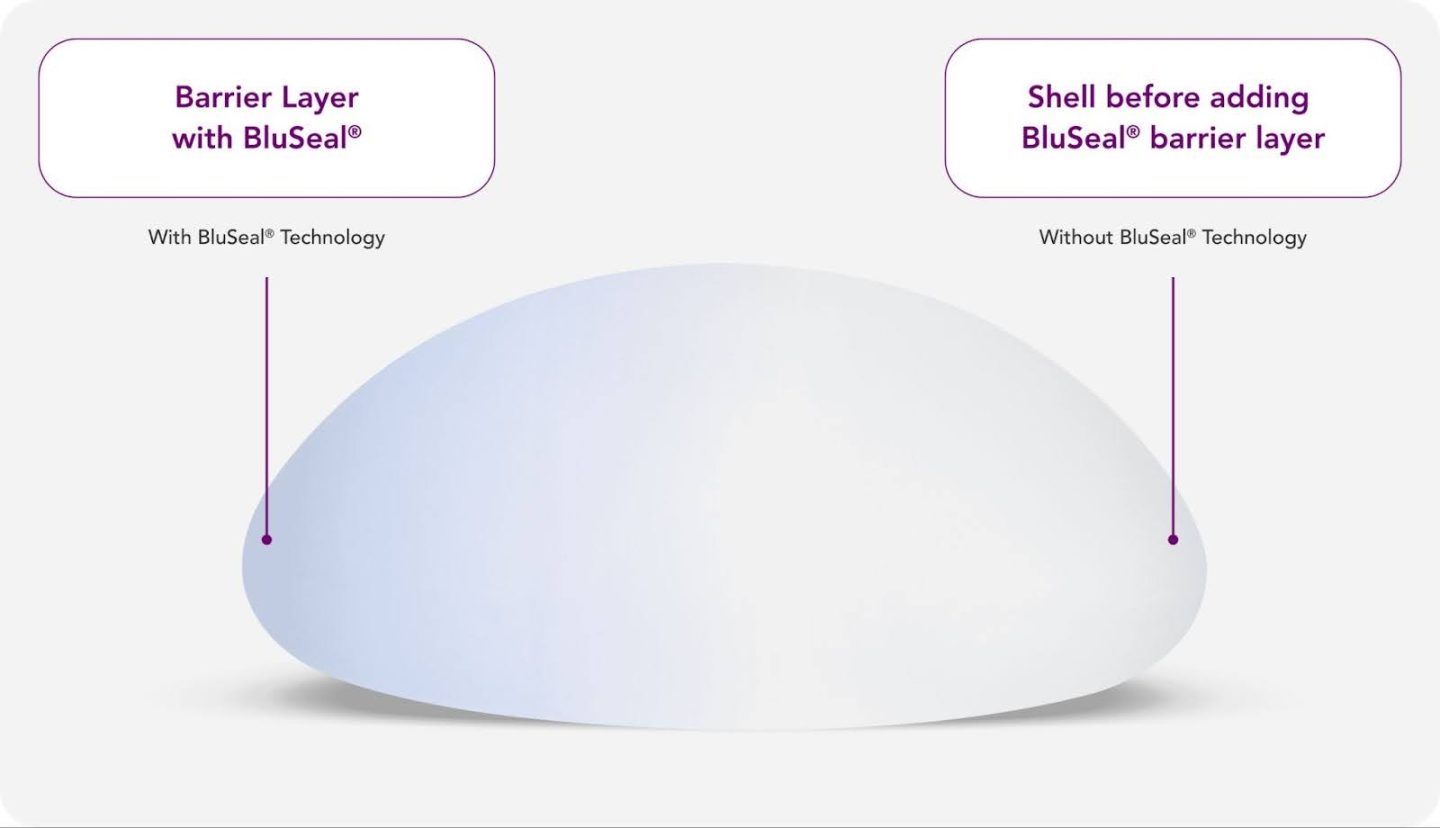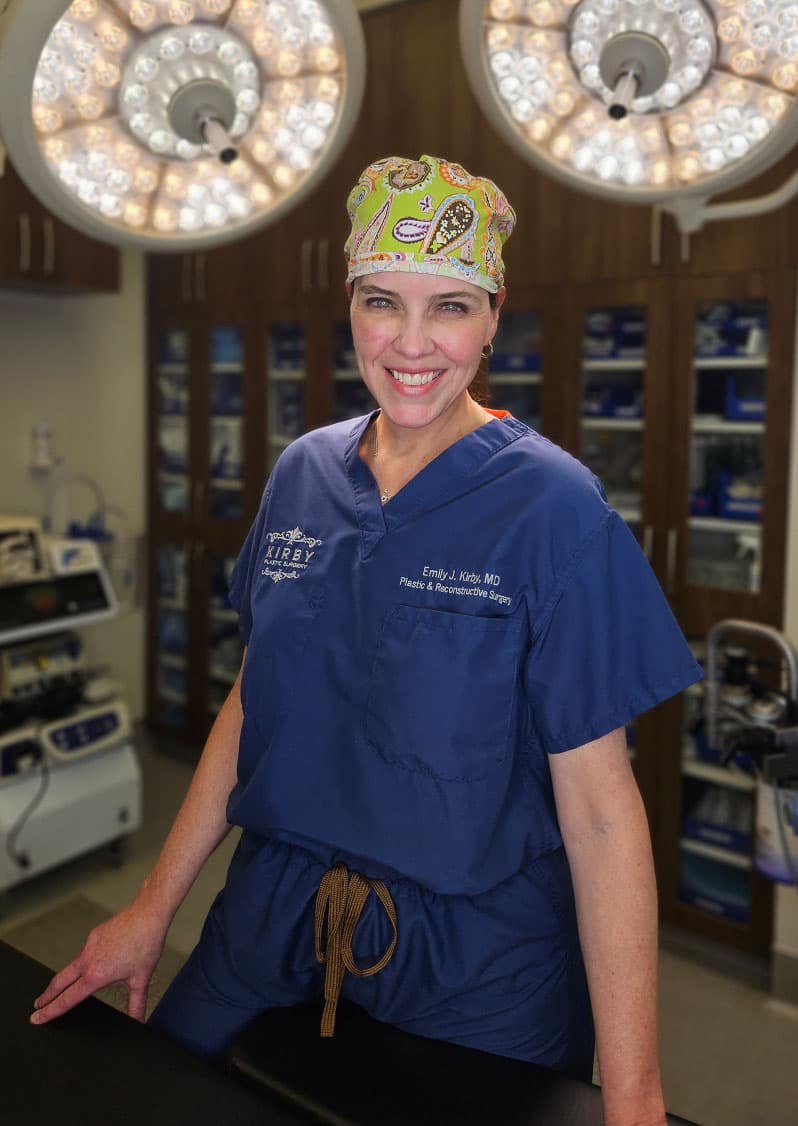Breast Augmentation Fort Worth

Are you interested in breast augmentation, looking to boost your cup size, improve symmetry, or restore your youthful curves? Curious about sagging and want to have a down to earth conversation about it? Come see us. Safe surgery, a smooth recovery, and beautiful, natural-looking results are probably at the top of your list. These are our priorities for you, too.
Board-Certified Plastic Surgeon Dr. Emily J. Kirby offers the unique perspective on breast augmentation that only a female plastic surgeon can provide. She’s passionate about helping her patients achieve a breast size and shape they’re happy to call their own—and with personalized techniques and dozens of saline and silicone breast implant options for you to choose from, she can help you love your new look, too!
Female Plastic Surgeon Fort Worth
- Board-Certified Plastic Surgeon
- Over 14 years of experience in private practice
- Founder and Medical Director of Kirby Plastic Surgery, Kalos Medical Spa, and City Surgery Center—a Quad A-accredited, state-of-the-art facility located onsite
- Specialist in breast surgery and body contouring, including postpartum
- Castle Connolly Top Doctor since 2019
- First female Chief of Plastic Surgery, Texas Health Resources Harris Methodist Hospital
What is breast augmentation?
Breast augmentation, or augmentation mammaplasty, is surgery that uses techniques such as breast implants or fat transfer to increase the size of your breasts. If weight loss or pregnancy have caused you to lose breast volume, this cosmetic procedure can create a more rounded breast shape. If your breasts are significantly different in size or position, this procedure can also help correct breast asymmetry.
Is breast augmentation right for me?
Every woman has her own reasons for wanting breast augmentation. Many of Dr. Kirby’s patients have always felt their breasts were too small for their bodies. Others want to reclaim their youthful or pre-pregnancy figure. Breast augmentation can be a great option to help with any of the following:
- You’d like your upper and lower body to be in better proportion
- You have a hard time finding tops and swimsuits that fit your chest
- Your breasts appear “deflated” after pregnancy or weight loss
- You’re bothered by uneven breasts and would like to improve symmetry
- You’re unhappy with your breast shape (i.e., tubular or “snoopy” breasts)
If you are taking a GLP-1 medication (semaglutide or tirzepatide) for weight loss, Dr. Kirby recommends waiting until you have reached your goal weight before scheduling your breast augmentation. Weight loss may reduce the amount of breast tissue you have, changing the size of the implant you desire. It may also cause your breasts to sag, in which case a breast lift may be added to your procedure plan to achieve a lifted appearance.
During your breast augmentation consultation, Dr. Kirby will listen to your concerns and goals, answer your questions, and help you determine if breast augmentation is the best decision for you.
What should I expect at a Fort Worth breast augmentation consultation?
Your consultation takes about one hour. You’ll spend most of that time with Dr. Kirby discussing your goals, concerns, and questions, and learning how Dr. Kirby tailors the procedure to address each of these. You’ll also get to meet our nursing staff who will take your vitals and review your medical history, and our patient care coordinator will schedule your procedure and help guide you through the process from start to finish.
Video transcript
Before your visit in our office, our patient care coordinator gives you a good idea of what to expect before, during, and after your visit with us. During the consultation, we discuss your desired results. I like to chat with patients long enough that I have a good understanding of what they’re looking for so that I have a good idea of what I can offer. We review medical history and family history for safety reasons. We used Touch MD to look at sample before and after pictures of similar patients and to discuss in detail recommendations for surgery, the pictures are saved to your account so you can access them later with any notes that we have made. The implants are available in all sizes to feel in our office, including the wide variety of silicone choices that are now available. Sizing is available during the consultation by trying on specially made Allergan sizing implants that give a realistic and feel of your new breast size in person. This is something digital tools just can’t replicate. After sizing our patient care coordinator returns to discuss any and all of the surgical options we discuss during your visit.– Dr. Emily Kirby, breast augmentation plastic surgeon
“I highly recommend Dr. Kirby and all the staff at Kirby plastic surgery. During the consult Dr. Kirby was caring and patient as she listened and answered every question I had. She never made me feel rushed. She listened to what I wanted in my breast augmentation and explained all the pros and cons to over vs under and various implant sizes without pushing an option I didn’t want. Mari the PA was equally great in my preop/post op appointment. Surgery went smoothly and I love my results.”
Choosing your breast implants
During your consultation, you’ll get to see, touch, and try on several breast implant options and ask any questions you may have. Dr. Kirby will help you narrow down your choices and make your decision based on:
- Your current breast size and desired size increase
- What will look best with your natural proportions
- How you want to look after breast augmentation
- Your age (saline implants are FDA approved for age 18+; silicone is FDA approved for age 22+)
- Your personal preferences for breast implant type
- Whether or not you are getting a breast lift too. A breast lift with augmentation lifts sagging breasts and restores volume in a single surgery. It’s a very popular option post-pregnancy or following weight loss.
While both saline breast implants and silicone breast implants can provide a beautiful result, most of our patients prefer the softer, more natural feel of silicone. INSPIRA® round silicone gel implants are our most popular choice. While still considered “gummy” implants, INSPIRA® implants feel more like natural tissue and offer you a choice in gel softness, allowing a customized fit for you and your preferences. They also have a smooth implant shell, which is considered the safer implant shell option. Dr. Kirby will ensure your decision will safely achieve the best possible outcome.
Our patients love the look and feel they get with INSPIRA® silicone implants!

Meet Motiva: the latest in breast implant technology!
Motiva breast implants are now officially approved in the USA for safety and efficacy, and Dr. Kirby is one of the first plastic surgeons to offer them in the Fort Worth area.

The SmoothSilk® Round implant maintains its shape and projection, regardless of body position, creating greater upper pole fullness while maintaining a naturally soft look and feel. The SmoothSilk Ergonomix® implant is designed to mimic the natural movement of breast tissue, shifting from a round to a teardrop shape based on how the body moves. Both implant options include Motiva’s advanced technologies and are covered by the manufacturer’s extensive warranty.
Motiva implants, developed by Establishment Labs, incorporate several innovations that set them apart from other options. Learn more about Motiva breast implants’ unique design »

Breast augmentation: what to expect
Your safety comes first
Choosing the right surgeon to safely perform your surgery is a crucial decision you must consider. Board-Certified Plastic Surgeon Dr. Kirby performs breast augmentation in her own accredited surgical center in Fort Worth. These operating suites are fully equipped to handle emergency situations and are staffed with highly-trained, qualified support team members. Anesthesia is provided by a board-certified MD anesthesiologist at City Surgery Center.
“I visited three plastic surgeons before deciding to go with Dr. Kirby. She gave the best explanation of my options and which was best for my body. She and her staff are so down to earth and friendly, I just felt like it was the right place to be. It has been about 2 months since my surgery and I’m so excited with my results.”
Your breast enhancement surgery
During your pre-surgery visit at our office, Dr. Kirby will provide helpful information and go over the steps of surgery with you, including incision locations and breast implant placement (over or under the chest muscle).
When you arrive at the surgery center on your surgery day, Dr. Kirby will meet with you again to answer any last-minute questions and to mark your skin for surgery. Breast augmentation typically takes less than 1 hour to perform (longer if you are having a breast lift or other procedures, too). After your surgery is complete, you’ll be cared for in the recovery room for a short time before going home to continue your recovery.
Sub-Fascial Breast Implant Placement (Preservation Breast Augmentation)
Preservation breast augmentation involves placing implants subfascially, or over the chest muscle, but under a thin fascia muscle layer, preserving the natural pectoralis muscle and its attachments. Before modern, cohesive silicone implants were available, submuscular placement (under the pectoralis chest muscle) was the best approach to hide visible implant rippling from saline implants and to help preserve a natural look and feel. Over-the-muscle placement “subglandular” implant position has historically led to a higher risk of capsular contracture.
Studies have now shown that subfascial placement has a safety profile similar to submuscular placement, reducing the risk of capsular contracture compared to subglandular placement. Although submuscular placement effectively conceals most of the implant, it requires a longer recovery and the implant shape can be affected when chest muscles are activated, leading to “animation” of the implant with movement of the chest muscles. Many patients are now considering over-the-muscle (but under the fascia, “subfascial”) breast implant placement.
Video transcript
When we place an implant in the chest, historically, we used to position it under the pectoralis muscle for safety reasons. More recently, we’ve returned to an older technique—placing the implant above the muscle—but with a refined approach. Instead of simply going above the muscle, we place the implant in a special plane under the fascia of the muscle. This is not the same as subglandular placement, where the implant sits directly above the muscle. Instead, it’s called subfascial placement, meaning the implant is positioned beneath the fascia. In this plane of augmentation, we get the benefits of both approaches. We maintain the safety profile of placing the implant under the muscle while avoiding distortion of the breast implant caused by muscle movement.
What do breast augmentation patients need to do before surgery?
We may ask you to stop or adjust medications or supplements that may interfere with your surgery. Depending on your medical condition, Dr. Kirby may ask you to get lab tests, a medical checkup, or an updated mammogram. If you use tobacco, it is very important to quit a number of weeks before you undergo breast augmentation surgery and abstain from tobacco products for a number of weeks following your augmentation procedure to achieve the best results possible. You will also need to arrange for a responsible adult to drive you to and from your surgery and to stay with you for the first 24 hours after surgery.
- View a basic list of medications and supplements to avoid
- Read about the dangers of tobacco use before plastic surgery
Real patient images from Board-Certified Plastic Surgeon Dr. Emily Kirby
*Individual results may vary.
What is breast augmentation recovery like?
After your breast augmentation procedure, you can expect to have some soreness, tightness, swelling, and possibly some temporary changes in sensation (too much or too little). Most patients return to a desk job within a few days to 1 week after surgery; however, soreness will likely last for a few weeks, depending on your activity. Augmentation incisions under the breast are easily hidden by a swimsuit or bra, and often by the breast shadow itself. Dr. Kirby will go over your scar care plan and information to help ensure that your augmentation scars heal as faintly as possible.
More information on breast augmentation recovery tips:
Dr. Emily Kirby ensures that every plastic surgery patient receives Enhanced Recovery After Surgery (ERAS) care to optimize recovery time and minimize pain. Dr. Kirby uses innovative pain reduction techniques, such as numbing anesthetics and small doses of different types of medications, to reduce discomfort from many angles.
“Dr. Kirby has created the most amazing experience. She is thorough and intuitive, sincerely cares about the work she does and perfectly marries listening to what you want and what science says.”
—Actual patient
What are the risks of breast augmentation?
All breast enhancement procedures involve risk. Those risks include capsular contracture, which may require surgery and/or removal of the implant to correct. Implant rupture requires implant removal and/or replacement. Other risks of a breast augmentation procedure are bleeding, infection, unacceptable settling of implants, skin rippling and permanently altered sensation in the nipple and/or other areas of the breast. Serious complications are very rare, but include implant-associated anaplastic large cell lymphoma (ALCL), which is has been associated with textured implants. The risk of ALCL is between 1 in 2,207 and 1 in 86,029 (compare this to your risk of breast cancer, which is 1 in 8). Genetics and low-grade infection play a role in patients who develop ALCL.
Routine Ultrasound Monitoring for Breast Implants
Dr. Kirby provides complimentary ultrasound screenings for her breast augmentation patients with silicone implants for convenience and peace of mind. The quick, painless ultrasound requires no consultation or preparation, and results are reviewed immediately.
Where are breast augmentation incisions and scars located?
Video transcript
For a breast augmentation the American Society of Plastic Surgeons only recommends the infra-mammary fold scar hidden under the shadow of the breast. Scars placed around the areola surrounding the nipple can widen and introduce bacteria around the implant. Scars placed in the axilla or armpit are not only more visible than other scars when wearing many styles of clothing but are frowned upon due to the increased possibility of bacterial contamination which can lead to many problems down the road. -Dr. Emily Kirby
- Key Benefits
- Glossary
- Increases the volume and enhances the shape of the breasts
- Corrects asymmetrical breasts for a more proportionate size and shape
- Helps restore breast volume and shape after pregnancy, breastfeeding, or weight loss
- For women who have undergone complete or partial mastectomy, breast implant reconstruction may play a role in restoring breast appearance
- Anesthesia: Medication administered to prevent pain during surgery. There are several types, including local anesthesia, which numbs a small area; regional anesthesia, which blocks pain in a larger area; and general anesthesia, which induces sleep and relaxation.
- Breast Augmentation: A cosmetic surgical procedure to increase the size of the breasts using implants or fat transfer.
- Breast Implants: Medical devices placed under the breast tissue or chest muscles to increase breast size. There are two main types: saline-filled and silicone gel-filled.
- Capsular Contracture: A complication of breast implant surgery where the scar tissue that forms around the implant tightens and hardens, potentially causing discomfort and altering the shape or position of the implant.
- cc (cubic centimeter): The unit of measurement used to describe the specific volume of breast implants. The choice of implant size, measured in cc, influences the final breast size and is determined based on the patient’s body frame and desired outcome. Measurement using cc is much more specific than using bra size, as brands and styles vary greatly.
- Cohesive Gel Implants (Gummy Bear Implants): Form-stable silicone gel implants known for their firmness and ability to maintain shape while closely mimicking the feel of natural breast tissue.
- Dual Plane Placement: A breast implant placement technique where the implant is positioned partially under the pectoralis major muscle and partially under the breast tissue, combining the benefits of both submuscular and subglandular placements.
- Inframammary Incision: An incision made in the fold under the breast, through which the implant is inserted, offering the surgeon optimal control over implant placement and minimizing visible scarring.
- Mammogram: An X-ray image of the breast used to screen for breast cancer. Women with breast implants require additional views for effective mammography. Mammograms for all women, including women with implants, are recommended every year starting at age 40, or earlier if advised by a physician.
- Periareolar Incision: An incision made around the edge of the pigmented areola at the base of the nipple, which Dr. Kirby may use for breast lift (mastopexy) rather than for breast implant insertion.
- Profile of Implant: Refers to the projection of the implant from the chest wall, with options ranging from low to extra full, chosen based on the patient’s choice of implant volume, chest measurements, and desired outcome.
- Recovery Time: The period after surgery during which the patient heals. For breast augmentation, this includes time for swelling and bruising to subside, and for the patient to gradually return to normal activities, typically ranging from a few days to several weeks. Recovery can be streamlined, but not rushed.
- Rippling: A potential complication of breast implants where the edges or surface of the implant can be seen or felt through the skin, often more noticeable in saline implants or in patients with thin breast tissue, and with implants placed in a subglandular position.
- Saline Implants: Breast implants filled with sterile salt water. They are inserted empty and then filled once in place, allowing for a slightly shorter incision and adjustable volume.
- Silicone Implants: Breast implants filled with silicone gel, known for their natural feel. They are pre-filled and require a slightly larger incision for insertion, depending on the volume chosen.
- Subfascial Placement: Placement of breast implants between the fascial layer (connective tissue), which overlays the pectoralis major chest muscle, and the muscle itself.
- Subglandular Placement: Placement of breast implants directly behind the breast tissue, in front of the chest muscle, often chosen for patients with sufficient natural breast tissue, constricted breasts, and competitive athletes, among others.
- Submuscular Placement: Placement of breast implants underneath the pectoralis major chest muscle, potentially offering more natural-looking results and lower risk of capsular contracture.
- Transaxillary Incision: An incision made in the armpit area through which the implant is inserted. Dr. Kirby does not perform breast augmentation with this incision placement because the high levels of bacteria in the underarm are thought to heighten the risk of capsular contracture, and because this approach may lead to widely spaced, malpositioned breast implants over time.
- Upper Pole Fullness: Refers to the fullness or volume in the upper part of the breasts, above the nipple. Achieving desired upper pole fullness is a common goal in breast augmentation, contributing to the overall aesthetic appearance of the breasts.
More information on our experience with breast surgery and breast implants
We like the longstanding advice of asking surgeons how many times they have performed an augmentation procedure and how often they perform that surgery each month. The best surgeons benefit both from their training and from the active, learned practice of operating on breast tissue over and over again.
Dr. Kirby and her team at Kirby Plastic Surgery have been named a Top 500 practice by Allergan, the makers of Natrelle INSPIRA® breast implants as well as Botox®, Juvéderm® fillers, and CoolSculpting®. Dr. Kirby is the only Top 500 provider in Fort Worth and is one of only three offices with this distinction in the Dallas-Fort Worth metroplex.
We are honored to be recognized among the busiest 1% of practices out of over 35,000 nationwide and are grateful for the confidence our patients place in us. Earning this award distinguishes our practice and symbolizes our many years of experience and depth of knowledge in helping men and women enjoy safe, beautiful outcomes using these products and treatments. It is a testament to our commitment to exceptional patient care through quality service and attention to detail.
References »
Christopher R. Costa, Kevin H. Small, William P. Adams, Bra Sizing and the Plastic Surgery Herd Effect: Are Breast Augmentation Patients Getting Accurate Information?, Aesthetic Surgery Journal, Volume 37, Issue 4, 1 April 2017, Pages 421–427, https://doi.org/10.1093/asj/sjw221
Coroneos CJ, Selber JC, Offodile AC 2nd, Butler CE, Clemens MW. US FDA Breast Implant Postapproval Studies: Long-term Outcomes in 99,993 Patients. Annals of Surgery. 2019 Jan;269(1):30-36. doi: 10.1097/SLA.0000000000002990.
Hadad E, Sualhi I, Legarda C, Seligman Y, Sorkin A, Dor O, Menashe S, Heller L, Wiser I. Silicone breast implant rupture is more prevalent in the dominant limb side: A retrospective cohort study. Journal of Plastic, Reconstructive & Aesthetic Surgery. 2023 May;80:126-132. doi: 10.1016/j.bjps.2023.02.016.
Guimier E, Carson L, David B, Lambert JM, Heery E, Malcolm RK. Pharmacological Approaches for the Prevention of Breast Implant Capsular Contracture. Journal of Surgical Research. 2022 Dec;280:129-150. doi: 10.1016/j.jss.2022.06.073.
Swezey E, Shikhman R, Moufarrege R. Breast Implant Rupture. 2023 Jan 16. In: StatPearls [Internet]. Treasure Island (FL): StatPearls Publishing; 2023 Jan–.
Procedures related to breast augmentation
- Breast lift
- Breast reduction
- Fat transfer breast augmentation
- Breast augmentation with lift
- Breast reconstruction
- Breast implant removal
- Mommy makeover
- Discuss your goals and concerns
- Obtain Dr. Kirby’s unique female perspective
- Review convenient financing options
- Call (817) 292-4200 or contact us today!
Area Served:

Medically reviewed by Dr. Emily J. Kirby — Updated on Mar 5, 2025
